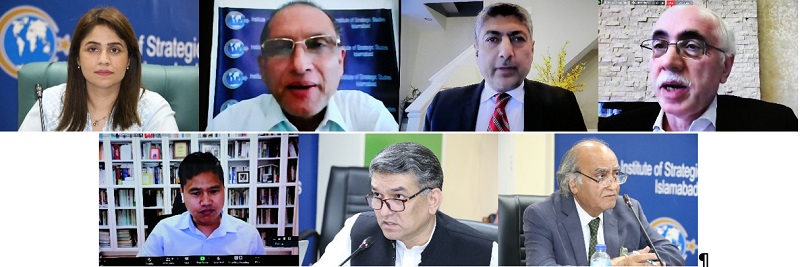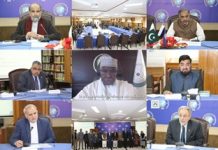Press Release
Panel Discussion
Pakistan-China-Afghanistan: Prospects of Trilateral Cooperation for Regional Stability
May 27, 2021

The Centre for Afghanistan, Middle East & Africa (CAMEA) at the Institute of Strategic Studies Islamabad (ISSI) had a Panel Discussion on Pakistan-China-Afghanistan: Prospects of Trilateral Cooperation for Regional Stability’. The distinguished speakers included: Ambassador Masood Khalid, Former Pakistani Ambassador to China, Ambassador Omar Samad, Nonresident Senior Fellow Atlantic Council and Prof. Lin Minwang, Deputy Director of the Center for South Asian Studies and Assistant to the Dean of the Institute of International Studies at Fudan University, China.
Ambassador Aizaz Ahmad Chaudrhry, Director General, ISSI, Ambassador Khalid Mahmood, Chairman ISSI and Dr Talat Shabbir, Director China-Pakistan Study Center (CPSC) at ISSI took part in the discussion.
During her opening remarks, Ms. Amina Khan , Director CAMEA, said that while supportive of peace and stability in Afghanistan, China for most of the part has deliberately kept away from the security aspect, and instead has focused on playing a more proactive and constructive role in terms of economic and political investment. However, China has now began to assume a key role, particularly exploring avenues to help bring peace and stability to Afghanistan by providing necessary facilitation between the Afghan government and the Taliban in realizing reconciliation, as well as help improve ties between Islamabad and Kabul, particularly through the establishment of the China-Afghanistan-Pakistan trilateral mechanism, which is dedicated to trilateral cooperation and cooperation, supporting and facilitate the Afghan peace process, enhancing regional connectivity and undertaking projects for regional development. Under the trilateral framework, there has been talk of exploring the possibility of extending the China-Pakistan Economic Corridor (CPEC) to Afghanistan under the larger BRI initiative. While the opportunities and benefits arising out of CPEC’s possible extension to Afghanistan remain vast, at the same time a number of the ambiguities and challenges confront the possible extension – revolving around lack of clarity, Kabul’s apparent reluctance, unstable security situation in Afghanistan, the complex nature of Pak -Afghan ties, regional rivalries including the Indo-Pak rivalry, and existence of numerous terrorist groups, to name a few.
She concluded by saying that Beijing’s growing interest and involvement in Afghanistan appears to stem from its trepidation of transnational terrorism, possible spread of militancy into its Xinjiang province, and support to Chinese militant groups i.e. the East Turkestan Islamic Movement (ETIM). She said that another factor that has led to Beijing’s increased focus on Afghanistan revolves around the extension of its larger BRI framework, regional politics, presence of the US, and the growing role of India in Afghanistan.
Ambassador Chaudhry said that trilateral meetings previously have failed to come to a logical conclusion. The security versus development dilemma has persisted and security has managed to be a priority. Focus on peace and stability and counterterrorism reign supreme and concurrently the development component involving trade and investment and a possible extension of CPEC. Pakistan wants peace on border, counter-terrorism, trade and people to people contact. China views Afghanistan as a neighbour and puts counter terrorism and economic development as priority. CPEC which both Pakistan and China champion depend on not only the Afghan peace process but also on other energy and trade development projects. Needless to say, any meaningful trilateral cooperation depends on peace in Afghanistan, he said.
On whether the trilateral can bring about any regional stability, Ambassador Masood Khalid said that the three regional actors – China, Pakistan and Afghanistan have different capacities and different domestic and international environments in which they take their decisions. China is a behemoth – an emerging power, Pakistan is a developing country with a struggling economy, and Afghanistan is as yet war torn. Much of the trilateral cooperation will depend on China’s willingness to bear the financial burden. He said that it goes without saying that China wants Afghanistan and Pakistan to work hard to overcome misgivings about each other. Depending on the ground situation, China will be willing to help Afghanistan in socio-economic development. China has already invested heavily in railway and mining in Afghanistan and is already a developing partner of Pakistan in CPEC. Trilateral cooperation will engage Pakistan’s workforce, industries, untapped resources and markets in both Afghanistan and Pakistan. China’s fundamental interest in Afghanistan is stability in Afghanistan and to secure its borders with Afghanistan in order to prevent terrorism from permeating through. He also said that China’s security dilemma is compounded with Beijing’s eagerness to see a US withdrawal from Afghanistan. The withdrawal can potentially lead to resurgence in terror activities in Afghanistan and their spillover into China. China has established close contacts with the Taliban and gained reassurance that ETIM will not spillover into Afghanistan. China is pursuing a wait and see policy in Afghanistan: cautious and flexible and its role is indispensable and central. He said that peace is a requisite for any meaningful trilateral cooperation to take place. Although China has invited India to join CPEC, India lies on the other side of the fence. Hence, India must reevaluate its relationship with its immediate neighbours if it wants to be a part of the regional matrix and connectivity structures.
On the topic of trilateral cooperation, Ambassador Omar Samad said that when we discuss trilateral cooperation and regional stability we should keep in mind that it is very complex and involves a lot more actors. What connects Pakistan and Afghanistan is not only shared geography but also geostrategic, common threats like poverty, inequality, oppression, counter terrorism- which can only be countered through interaction and cooperation. He said that we are on the threshold of a great game. Collaboration is increasingly becoming geoeconomic and involves everything from crypto-currency to backing and financial exchanges. China has made it clear that it is dedicated to improve connectivity and build an open inclusive world community. The Afghan conflict serves as a distraction to the economic connectivity of the region. There is also the danger posed by civil and militant proxy wars that will potentially fill the vacuum left behind by American forces. He said that Pakistan has a major role to play as a neighbour. The least destructive and best case scenario is to go towards a political settlement. At the end of the day it is the Afghan people who matter and the Taliban must understand that a lot has changed in Afghanistan since the 1990s. Afghan’s need to know that the right to self-determination and civil rights are fully ensured. All stakeholders need to focus on playing a constructive role. The more stress we put on the peace process, an inclusive political setup and an equitable solution, the more there is a chance of progress. He also said that for China, CPEC and China-Central Asia corridor are both crucial for the success of BRI and in their junction lies Afghanistan and as a result a host of dividends through these corridors. China and Pakistan are both important players and together there is a lot that they can do to untangle the issues that hinder the inter-Afghan dialogue. At the end of the day it is the Afghan people that have to give their approval to a future setup that is inclusive to the Taliban as well.
Prof. Lin Minwang said that China’s interest in Afghanistan is multifaceted, particularly in the avenue of counter-terrorism. Routes from Central Asia lead to China historically. Geo-strategically Afghanistan is very important as it is located at the crossroads of two economic corridors – CPEC and the China-Central Asian Economic Corridor. Spillover of instability from the Xinjiang province into Afghanistan is a prime concern for Beijing. In this regard, China believes that instability in the region can be countered through economic development. He said that foreign interference in Afghanistan has been detrimental to the Afghan society. He reinforced that there is no power vacuum that needs to be filled; Afghanistan belongs to Afghan people. On trilateral cooperation he said that this mechanism is really important for China seeing as it is a very important partner of Pakistan and Pakistan and China have a convergence of views in Afghanistan. However, the political situation in Afghanistan is of great concern. Improving connectivity with neighbouring countries is very important as it will allow full exploitation of the region’s economic potential. Economic corridors are the way to go about it, he said. On the question of how regional rivalries jeopardise Afghanistan’s inclusion in CPEC, he said that India is the prominent power in the South Asian region and when it comes into progress India is bound to oppose it.
Dr. Talat said that there is a convergence between Pakistan and China regarding peace, connectivity and prosperity in the region. In this regard existing forums will allow engagement between all players including Afghan leaders, China, US and Pakistan. It is important for China to have peace in its periphery since expansion of BRI necessitates this. Both China and Pakistan hope that peace will prevail post US withdrawal from Afghanistan. However, he said that for any development, peace in Afghanistan is important and at the moment the post-withdrawal scenario is still debatable since September 11 seems a long way off. It goes without saying, Pakistan wishes for a peaceful withdrawal, he concluded.
Ambassador Khalid Mahmood stated that Pakistan, China and Afghanistan cooperation can be viewed through the lenses of peace and stability, development, reconstruction and counter-terrorism – the last three are dependent on the first factor. Afghanistan’s cooperation is restrained by spoilers inside and outside of the country. We need a wider regional consensus which is backed by the US and other western countries. If the US is onboard then India will also automatically be also onboard.











